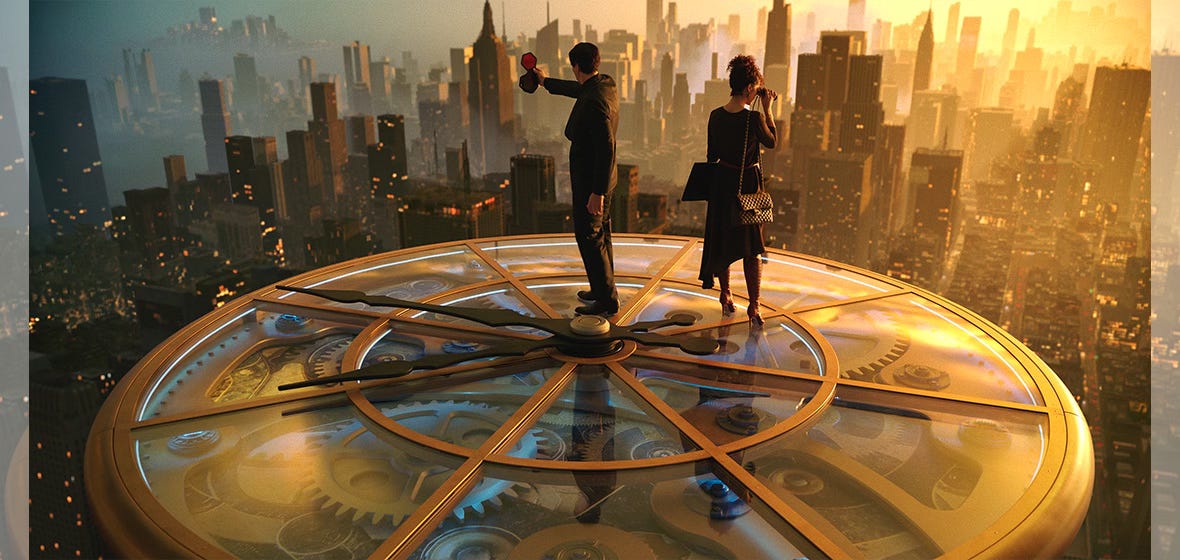When watching Megalopolis, it’s hard to argue with Francis Ford Coppola’s central observation that modern America is like the Roman Empire while it was declining. Megalopolis could have been a wake-up call, but it won’t reach a wide enough audience, because it is crazy. And I mean really, impenetrably crazy.
The brilliant, arrogant, altruistic hero is Caesar Catilina (Adam Driver), an architect in a modern, alternate version of ancient Rome, who dreams of turning his city into a utopia. He has a shortsighted nemesis in a mayor named Cicero (Giancarlo Esposito); the mayor’s daughter Julia (Nathalie Emmanuel) comes between them.
Soon, the protracted tangents, bizarre performances, and hallucinatory montages come between Coppola’s message and his audience. Megalopolis is billed as a fable, but I don’t remember Aesop being this challenging to distill. Countless confounding creative choices are always in the air, vying for the viewer’s attention and making Coppola’s 1992 version of Dracula look like a 1950’s nature documentary.
I mean it when I say that it’s all pulled together by Coppola’s sledgehammer earnestness. The chariot race in Madison Square Garden comes to mind. Also, the narration from Lawrence Fishburne, who constantly tells us what we’ve already gleaned from story elements that were not subtle in the first place. The characters spout monologues, quoting everyone from Shakespeare to Marcus Aurelius. They spell out the movie’s themes, during card games, interviews, and speeches.
At first, Coppola’s sincerity is charming. For a time, one is tempted to just go along with the movie. Then comes the scene with the endless drug-induced hallucination, which is intercut with Shia LaBeouf, dancing around in a wig.
Why does Caesar have the power to freeze time? Probably because he’s the only inhabitant of the city who ever slows down to thoughtfully survey his surroundings. There is virtue in quietness; there is virtue in stillness. Personally, I can feel it more and more with each passing day. But Caesar’s power to freeze time is never explained and has nothing to do with the plot. It also comes in the midst of a violent, over-sexualized cacophony of a film. And a worthy message gets lost.
I’ve read that Caesar’s time-stopping magic comes from his proximity to Megalon, a miracle substance he developed for building his utopia. As Caesar works, Megalon is shown, hovering in the air and shifting its shape, containing images that reflect Caesar’s thoughts and ideas. But if this is the source of his power to freeze time, it is never made clear. At least all these elements make for some beautiful visuals.
Megalopolis is obvious in its broad strokes, yet baffling when one tries to parse out Coppola’s individual ideas. I do want to stress that the broad strokes are noble. Caesar is a stand-in for the filmmaker, who clearly views himself as a kind of Cassandra, urging everyone to reverse the decay in the air, before it’s too late.
Coppola’s commitment to his message is apparent in every frame.
But if his motivation was to spark a conversation that would help save the world, why did he make such a difficult film for mainstream moviegoers to wrap their minds around? Maybe after spending forty years developing this movie, he was too close to his creative vision to realize it wasn’t translating into relatable entertainment.
Coppola’s quest to get this movie made has been well-documented. He invested his own fortune, and claimed that he didn’t care about making it back. He said that he wanted people to revisit Megalopolis every year, like It’s A Wonderful Life.
He went outside the system; did the Hollywood establishment really feel threatened?
Did they want to see the movie fail?
I am in no way defending modern Hollywood suits and their pathological aversion to risk, but I think we can now be certain that there was no conspiracy to sink Megalopolis. No one in their right mind was ever going to spend money making or promoting it. Megalopolis is not the weirdest film I have ever seen, although it’s in the ballpark. It is the weirdest film that was ever intended to win over a mass audience. It’s an art film that cost a hundred and thirty-six million dollars.
I will say this: when I emerged from the theater, I was shell-shocked and overstimulated. A movie that affected me as much as Megalopolis must have been doing something right. Yet I did not have fun while watching it, and now that it’s over, I have no interest in decoding everything that happened. After some films, I want to have a two-hour long conversation. In other cases, I just throw up my hands.
I genuinely hope that Coppola is happy...and I’m glad I saw Megalopolis once.
Its themes are painfully relevant.
Now I think I will go watch Apocalypse Now for the hundredth time…
Or The Godfather for the thousandth.




